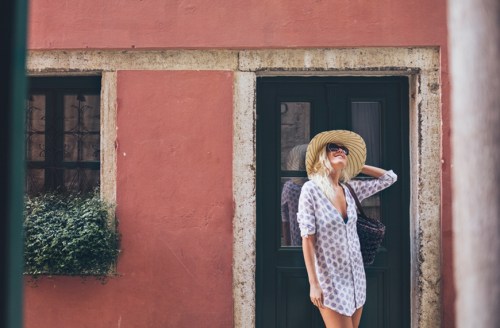*This* is the sunscreen you should be using if you have rosacea
If you have rosacea here's what you need to know about handling it, and spending days in the sun. Because heat can actually make the condition worse.

Rosacea is a hard-to-manage inflammatory skin condition that often materializes itself through the presence of constant or extreme flushing, temporary increases in redness and bumps on the nose and cheeks, as well as dilated blood vessels. This isn’t exactly good news during any season but it’s a special point of concern in the summer since being in the sun creates an inflammatory nightmare for your skin.
So while everyone should be wary of UV rays, come May, people with rosacea are especially susceptible. “Rosacea can cause flushing that can flare with things like heat, spicy foods, alcohol, exercise, and stress,” explains Jeremy Fenton, MD a dermatologist at Schweiger Dermatology Group. So while he’d advise you to be cautious of the rosé and hot yoga classes, if you skew rosier, the sun is also pretty high up there on the list of public enemies.
In fact, the National Rosacea Society surveyed 431 people and found that 80 percent said that spending time in the sun caused their condition to flare up, and the same number agreed that spending time in hot weather in general created a worsening effect in their overall condition. So, yeah: That’s not exactly ideal news especially given the slew of sunny days in the forecast.
This Parisian Skincare Brand Is Launching in the United States for the First Time—Here’s What a Derm Wants You to Know

We’re Calling It: Cleansing Balms Are the Face Wash of the Future—Here Are 3 to Add to Your Cart

This Is the One Product That Scarlett Johansson Always Keeps in Her Purse and on Her Bedside Table

Here’s the good news: Another study found that 88 percent of participants in a National Rosacea Society survey said that sunscreen helped reduce the number of flare-ups that they experience. According to Dr. Fenton, the best one to reach for is a physical sunblock with an active ingredient of zinc oxide or titanium dioxide. Why so? These active ingredients tend to be gentler on the skin and work by sitting atop the skin and providing a physical barrier that deflects the sun. Alternatively, chemical ones with common active ingredients such as avobenzone, octinoxate, octocrylene, and homosalate function by absorbing rays, turning UV into heat, and releasing them from skin. This reaction could cause irritation in those with rosacea, further irritating the condition.
Aside from picking a smart sunscreen you should also practice the usual best sunscreen practices—make sure to reapply frequently, as in every two hours. Should you accidentally encounter a sunburn, Dr. Fenton says you should follow a pretty standard routine: Avoid further sun exposure, stay hydrated, use aloe vera to soothe the skin, and avoid exfoliants or harsh chemicals.
As of right now, there still isn’t a cure for rosacea—much of the nature of the condition is still shrouded in mystery despite understanding its triggers. So until the day when we boast a greater understanding, be wary of spicy foods, stay away from wine, and avoid the sun—along with everyone else. With that knowledge in mind you can pitch your summer beach tent.
Surprisingly, you can actually get a sunburn on your eyeballs and your late-night snacking could be making your sunburn worse.
Sign Up for Our Daily Newsletter
Get all the latest in wellness, trends, food, fitness, beauty, and more delivered right to your inbox.
Got it, you've been added to our email list.







